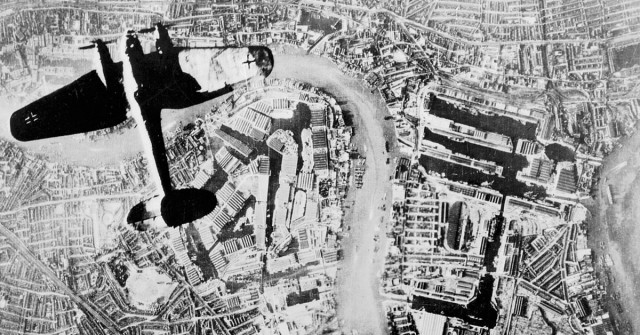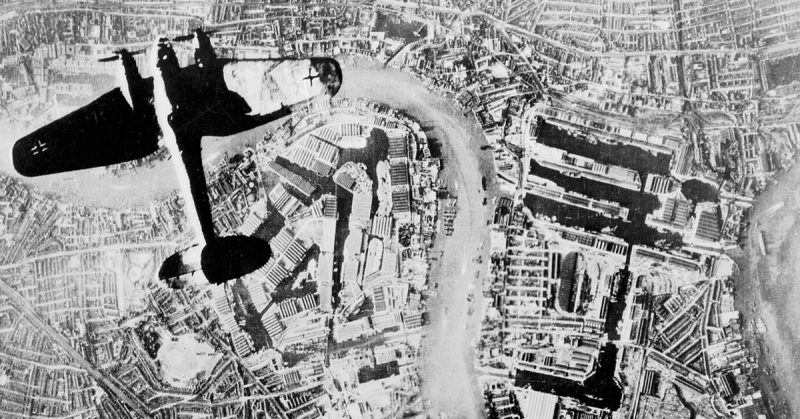
German Air Raids on Britain were a feature of World War II, with bombing raids concentrated on strategic ports, important manufacturing cities and the capital city of London. The raids began on 7th September 1940 and continued unabated until 21st May 1941. London’s citizens had to deal with night-time bombing, air-raid sirens and nights spent in bomb shelters. Each morning, they had to face the devastation caused by the bombing and the resultant fires.
London suffered a total of 71 raids during this period which was known as ‘The Blitz’. In London alone, more than a million houses were damaged or destroyed, approximately 28 000 civilians were killed, with about 25 000 more injured. By the end of the war, over 100 tons of explosives had been dropped on 16 different cities and a total of 40 000 civilians killed. The Blitz caused enormous damage to Britain’s infrastructure, housing and lives.
As the raids continued, ordinary citizens offered their services as unpaid Defence Volunteers. Some people became volunteer fire-fighters, many joined teams which helped to search for survivors in bombed houses and there were many who joined first aid groups. People began to help one another to reach the bomb shelters (mostly the underground stations) where they slept, night after night. Volunteers became story-tellers, readers or entertainers and helped to keep these displaced people amused. With the hardships they faced each night, a ‘Blitz Spirit’ developed amongst the Londoners – everyone would lend a hand when and where they could. Some people even made tea for the volunteer helpers or for anyone else in need – they were “All in this together!”
While “the majority of civilians pulled together for the war effort… some used the situation for their own criminal ends” (D. Leatherdale.) Statistics show that crime figures rose from 303 771 cases in 1939, to 478 000 in 1945 – a dramatic upswing. A look at some of the crimes reported during this period, gives an idea of the varied nature of the criminal acts committed.
As the bombing continued, the number of badly damaged buildings and bomb-sites grew, attracting plenty of looters. In spite of preventative measures and the patrolling of sites, looting went on unabated, sometimes even during the air-raids. One report tells of a man who returned to his home after such a raid to find that looters had stripped his house – even ripping up the carpets.
Shops were targeted and thieves, under cover of the bombing, would break in and take what they could. Jewellery and clothing shops were the favourite targets, so too grocery stores, but once two men were caught looting a wine-sellers’ shop. Some people became volunteers, such as Air Raid Wardens, as cover for their looting. In November of 1940 for example, 20 of the 56 cases on the court roll dealt with looters – and 10 of those looters were auxiliary firemen!
Many crimes were committed as a direct result of the regulations and laws governing the war situation. The Government compensated those whose houses had been destroyed by bombing to the tune of £500. One cannot be sure of how many people managed to work the system, but one man was finally caught when he applied for compensation for his half-ruined 19th house, that had not been hit by any bomb.
Rationing was introduced, which the majority of people accepted as being a necessity, yet many flouted the regulations, managing to fiddle the system. In some cases, people would continue using the ration books of an elderly relative who had already died. Frequently, extortionate prices were demanded for goods, often way above the control prices set by Government. Black marketing flourished. Some London hotels were charged with receiving thousands of black-market eggs. (Government rations limited eggs to 1 per week, per adult.)
One report tells of an aircraft gunner shooting his superior officer- and killing him – in a dispute regarding rations. Food shortages became a critical issue. Farmers were legally obliged to grow food and in one instance a farmer was charged for not planting the two acres of potatoes as ordered by the agricultural ministry.
An overall black-out had been instituted in order to make it difficult for enemy aircraft to locate targets, yet many people were charged for ignoring it. The nightly black-out however, besides being helpful to looters, was very useful to prostitutes and pickpockets and led to an increase in petty crime, as well as a big increase in the number of sexual assaults reported. People, especially women, became too frightened to go out after dark.
Particularly horrendous were the instances when people were discovered removing rings from the bodies of those killed in bombing raids. Even worse, were cases where murderers had hidden their victims’ bodies in the rubble of raid-damaged houses, hoping they would be taken for bombing victims. Harry Dobkin, for example, was hanged in 1943 for having murdered his wife and buried her body in the basement of a bombed out chapel.
The war also had an adverse effect on the younger population, a great number of whom had been moved out of London to safer places in the country. A police review suggested that lack of parental control and boredom contributed to a sharp rise in juvenile delinquency. In 1939, approximately 52,000 children under the age of 17 appeared in court, but 2 years later the number had risen to 72,000. The reports of delinquency included stealing money, vandalism and the theft of food. Two boys even broke into a munitions store and stole a sizeable batch of anti-tank bombs.
World War II brought out the GOOD in most people, but it also gave many BAD people, opportunities during the disorder caused by the air raids. The breakdown of normal society allowed them to further their criminal aims. The war allowed an UGLY situation to arise, which enabled these people to manipulate, plunder, destroy or even kill for their own ends.
While this is indeed a sad reflection on human society, we must not forget what the historian, J. Gardiner has said: “Human nature doesn’t change….there were those willing to abuse the situation for their own advantage [but] there was a great deal of bravery, strength and fortitude shown by many people.” We should thus not forget the countless, good people – all heroes in their own right – who carried Britain through its darkest hours, to the final victory.
